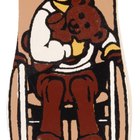
If you or a loved one are 60 years of age or older, and have an income that does not exceed 185 percent of the federal poverty level, you are considered a low-income senior. This means you are part of group that likely is struggling to make ends meet. Grappling with high housing costs and a low monthly income can have detrimental consequences. If this scenario sounds familiar, a senior housing program might be available to ease your burdens.
HUD
The U.S. Department of Housing and Urban Development uses federal money to offer housing programs for seniors who meet certain financial criteria. Elderly residents with a household income that does not exceed the specified median income for their locality might qualify for public housing at a reduced rate through Section 8 or another federal grant program. Applications for public housing are available at local HUD field offices and housing agencies.
State Vouchers
State-funded, low-income housing programs are another option for seniors who do not fit the income criteria for federally backed programs. Some states, such as Massachusetts and Virginia, offer project-based and mobile-based voucher programs that assist low-income senior citizens with monthly rental payments. While project-based vouchers require applicants to choose an apartment within a specific housing development, mobile-based voucher systems allow seniors a wider array of housing options. Applications are available at State Housing Consumer Education Centers.
Department of Aging
Seniors who do not qualify for low-income housing through a state voucher system or HUD might wish to apply for services at the county level. The Department of Aging within each state has parameters that help provide qualifying seniors with affordable housing. Each county within a state maintains an approved list of affordable housing for eligible senior residents. Applications are reviewed first-come, first-served and income verification is necessary.
Assistive Services
Community-based services are also available for low-income seniors. Transportation, emergency services, recreational activities and food delivery all help to improve quality-of-life. While many of these services are need-based, programs such as food delivery might require proof of income. For low-income seniors who require personal support and health services, community-based, assisted living facilities are an option. Information about these facilities is available by contacting community organizations directly.
Related Articles

How to Get Rental Assistance for Seniors

Qualifications to Enter a State-Run ...

Kentucky Federal Grants for Single Moms

How to Get Paid to Care for Someone on ...

Grants for Christian Counselors

Programs to Take Care of a Disabled ...

How Much Money Does a Refugee Get from ...

How do I Purchase Master Card & Visa ...

Income Limits for Food Stamps & ...

Pennsylvania Grants for Adopted Children

Government Grants for Churches

What Is Transitional Housing?

Government Funding for Taking Care of ...

Who Gives Donated Vehicles to the Poor?

How to Get Emergency Cash Assistance

Free Grants for Churches

Grants for Private Christian Schools

How to Get Paid to Care for a Relative

How to Write a Letter of Intent to ...

How Much Are Monthly Disability ...
References
Writer Bio
Jonae Fredericks started writing in 2007. She also has a background as a licensed cosmetologist and certified skin-care specialist. Jonae Fredericks is a certified paraeducator, presently working in the public education system.
Photo Credits
Jupiterimages/BananaStock/Getty Images